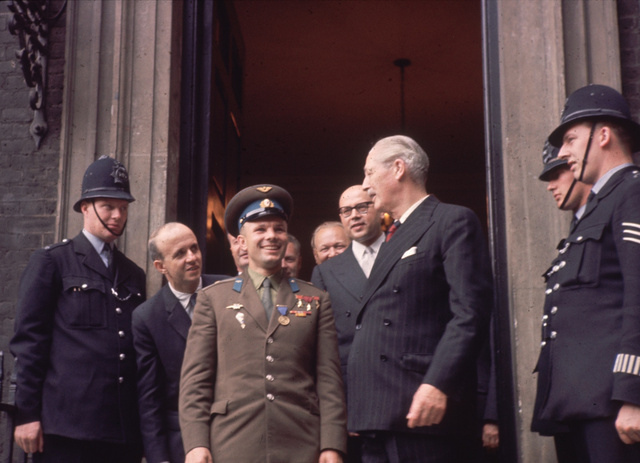The Tories’ status as a largely English entity makes prospects for One Nation Conservatism bleak
From a high watermark of over 50% at the 1951 General Election, the Conservative Party is now near-invisible in Scotland, with just one MP north of the border. In the wake of the Scottish independence referendum, Richard Hayton argues that the Tories more recent status as a largely English party makes an embrace of the kind of “One Nation” policies adopted during their more successful period in Scotland unlikely.

Harold Macmillan, standard bearer of ‘One Nation Conservatism’. (Credit: Leonard Bentley, CC BY ND 2.0)
For students of British politics, 1951 is not a defining year evoked alongside the likes of 1997, 1979 or 1945. Yet it has its place in the electoral history books, marking as it did the commencement of thirteen years of Conservative rule, just six years after the country had decisively rejected the party in favour of Labour’s promise to build a New Jerusalem out of the wreckage of World War II.
The customary telling of this story attributes this rapid reversal of fortunes to the Conservatives’ willingness to embrace the greater part of Labour’s agenda and forge a post-war consensus which accepted the need for an extended and interventionist state. The 1951-64 period is accordingly remembered as the high water mark of One Nation conservatism.
However, One Nation conservatism involved more than an acceptance of Labour’s economic and social reforms. It also encompassed a patriotic appeal to Britishness and the UK state that helped the Conservatives reach across class boundaries by presenting themselves as the national party.
Strange as it may seem today this resonated powerfully in Scotland, where the ideology of British Unionism helped the party secure the support of a significant chunk of the working class vote. Indeed, while the general election of 1951 is recalled by psephologists for the fact that it delivered Winston Churchill’s party a majority of the seats at Westminster on a smaller share of the vote than that cast for Clement Attlee’s Labour, it is less frequently noted that in Scotland the vote-shares were reversed. More famously at the following election in 1955 the Conservatives went on to capture more than 50 per cent of the vote in Scotland, a feat matched not matched before or since.
Fast forwarding to 2014, Conservative voters in Scotland retain a powerful sense of attachment to the Union. A remarkable 98 per cent of those who voted Conservative in the most recent elections to Holyrood voted no to independence, making them by far the most partisan in their voting patterns (by contrast, 20 per cent of SNP voters went against their party line by voting no).
These days of course Conservative voters make up only a small proportion of the Scottish electorate, as support for the party north of the border has fallen precipitously since the 1960s. Since 1992 the party has languished on around 17 percent of the vote in general elections in Scotland (around half the share it has attracted in England). Part of the explanation for this no doubt lies in the declining attachment to a sense of Britishness and the rise of Scottishness. As my colleague David Seawright has argued, the Conservatives’ main opponents in Scotland ‘successfully portrayed the Tories in Scotland with the negative universally disapproved symbol of ‘un-Scottish’.
As the Conservative Party conference in Birmingham – the last before the 2015 general election – most of the delegates will have no doubt been more concerned to hear about David Cameron’s plans to appeal to voters in England, rather than Scotland.
The prospect of further extensive devolution of powers to Scotland without measures to counter balance these in England is something that David Cameron knows that his party will be unwilling to accept. Attempting to head off these concerns his statement in Downing Street just hours after the referendum result was announced he stressed that: ‘We have heard the voice of Scotland – and now the millions of voices of England must also be heard. The question of English votes for English laws – the so-called West Lothian question – requires a decisive answer.’
The chairman of the influential 1922 committee of Conservative backbenchers, Graham Brady, suggested that: ‘Some days we could sit as an English Parliament, other days as a UK Parliament. Some variant of English votes for English laws is the minimum to meet the expectations of the English electorate.’
The partisan dimension to this is well known, and with the Conservatives holding just one seat in Scotland, Brady might have easily said that English votes for English laws is the minimum Cameron must deliver to meet the expectations of Conservative backbenchers and party members.
UKIP have already demanded that in addition to English votes for English laws the number of Scottish MPs be cut and the Barnett formula scrapped, adding grievances over the governance of England to the list of issues on which they will pressurise David Cameron and his party between now and the general election.
Some rebalancing of how legislation is passed at Westminster is surely sensible in the light of further powers being passed to the Scottish Parliament, and the Labour leadership would be advised to engage seriously with the process. The compromise proposed in the McKay Commission of an English Grand Committee in the House of Commons would ensure that the voice of English (or English and Welsh) MPs was heard without undermining the prerogatives of all MPs from throughout the UK. If Labour fails to accept this the issue will no doubt become a key dividing line at the forthcoming general election.
Nonetheless such a reform, or even fully blown English votes for English laws, would not answer the deeper questions posed for David Cameron and his party by the decline of Conservative Unionism. A commitment to the nation has always been a central aspect of the party’s philosophy but the question now is which nation: England or the ‘fifth nation’ of the UK?
Fearful of its negative connotations, the Conservatives have shied away from embracing English nationalism even as they have become a much more English party. The referendum on Scottish independence seems to have pushed a rising number of Conservative MPs into adopting a stance of speaking ‘for England’ rather than for the United Kingdom as a whole. But this inevitably raises contradictions for them as they remain wedded to the UK state, even if they are fractious about the costs of maintaining it.
Patriotism has traditionally been at the heart of Conservative electoral strategy and this is likely to remain the case. Quite what form this national appeal will take though is far from clear. It seems unlikely however, that we will ever again see one nation conservatism, as it was traditionally understood, at the forefront of our national politics.
—
Note: this post originally appeared on the Crick Institute blog and is reposted with permission. It represents the views of the author and not those of Democratic Audit or the LSE. Please read our comments policy before posting.
—
 Richard Hayton is a Lecturer in Politics at the University of Leeds, and a Trustee of the UK Political Studies Association (PSA). He is the author of Reconstructing conservatism? The Conservative Party in Opposition, 1997-2010 (Manchester University Press, 2012).
Richard Hayton is a Lecturer in Politics at the University of Leeds, and a Trustee of the UK Political Studies Association (PSA). He is the author of Reconstructing conservatism? The Conservative Party in Opposition, 1997-2010 (Manchester University Press, 2012).





 Democratic Audit's core funding is provided by the Joseph Rowntree Charitable Trust. Additional funding is provided by the London School of Economics.
Democratic Audit's core funding is provided by the Joseph Rowntree Charitable Trust. Additional funding is provided by the London School of Economics.
@JamesNewton92 https://t.co/nMbd7StSk2
The Tories’ status as an overwhelmingly English entity makes prospects for One Nation Conservatism in the UK bleak https://t.co/actOWKvZzY
Interesting thought as a reflection on a party which really is only English now – a big difference from 1950s https://t.co/IvI7JPU9K7
Does an English-dominated Conservative Party mean the end of One Nation Toryism? https://t.co/zE6fNtLh0M https://t.co/3c0WEY7tBv
The Tories’ status as a largely English entity makes prospects for One Nation Conservatism bleak https://t.co/actOWKvZzY
Excellent article. I’d like to add ‘watch this space’ on the Labour Party in Scotland. I suspect many ‘No’ voters in the Scottish Referendum will now be looking askance at Gordon Brown following the travails befalling his ludicrous promise of ‘nothing less than a modern version of Home Rule for Scotland’. We had the news today that he has launched an appeal for a 100,000 signature petition for Westminster Tories to ‘honour the vow’ on more substantive powers for Scotland after a No vote. Brown has, in effect, verified that when he and the Westminster Trio of Leaders made that risible ‘vow’ they did not have the means (nor even the intention on the part of at least one ‘vower’?) to deliver. Indeed, there were commentators at the time who complained of such promises being made when the ‘No’ perpetrators knew perfectly well that an already restless Middle England would not tolerate it.
For hitherto Labour voters in Scotland that comes on top of the uncomfortable reality during the referendum campaign of Scottish Labour eagerly lining up with big corporate interest meddling in what was a democratic process. After all, Scottish Labour citing as ‘independent’ and ‘expert’ the likes of Standard Life, ASDA (yes ASDA) and Deutsche Bank (Regulator fined & largely left Scotland)!
Gordon Brown now complains of a Tory Trap on devolution… well if you’ve made the bed … Ther again if you were so daft as not to see that one coming…
Milliband is now in an impossible bind – honour the vow and lose more Middle England’,or mollify Middle England and risk huge damage to Labour in Scotland?
As I suggest, ‘watch this space’ on future Labour in Scoltand prospects.
The Tories’ status as a largely English entity makes prospects for One Nation Conservatism bleak https://t.co/LypdOsXr1F